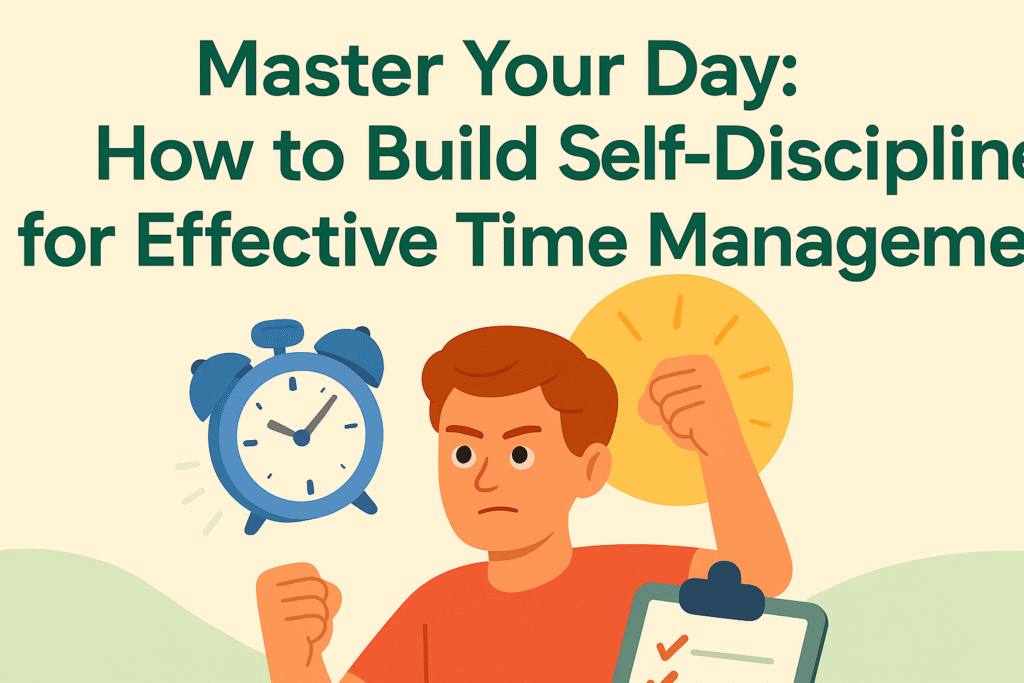Have you ever looked back at the end of the day wondering where all those precious hours went? Maybe you started out determined to finish your project but somehow ended up scrolling through videos, reorganizing your closet, or binge watching an entire season of a show you don’t even love. You are not alone. The struggle to build self-discipline for effective time management is something almost everyone wrestles with, especially in a world overflowing with distractions.
I still remember the first time I realized I was losing control of my time. When I was in college, juggling classes and a part time job. I kept telling myself that I’d study “in just a minute.” But the minutes turned into hours, and soon I found myself panicking at 2 a.m., trying to cram an entire textbook before sunrise. That night, I promised myself something had to change.
🎯 Make Time Management Your Superpower: 7 Simple Shifts to Transform Your Routine
Self-discipline is not some mystical trait you’re either born with or without. It’s a skill you grow, like a muscle. Here are some surprisingly approachable steps to help you finally master your day.
1. Start Your Morning With a Non-Negotiable Ritual
A small, consistent habit like stretching for five minutes or writing a one line journal entry signals to your brain that today is going to be different. This micro commitment sets the tone for bigger tasks.
2. Visualize Your Future Self
Picture yourself six months from now, confidently completing your projects and feeling proud of your discipline. This mental image makes it easier to resist momentary temptations.
3. Use the “10-Minute Rule”
Promise yourself you’ll work on your task for just ten minutes. More often than not, you’ll keep going. Starting is the hardest part.

4. Break Big Goals Into Tiny Wins
Instead of saying, “I’ll write this whole report today,” decide to finish only the introduction. Small victories motivate you to keep moving.
5. Track Your Time Honestly
Keep a journal for a week noting exactly how you spend every hour. You might be shocked at how much time slips away unnoticed. Awareness is the first step to reclaiming it.
6. Build an Environment That Nudges You Forward
Silence notifications, clear visual clutter, and create a dedicated workspace. When your environment supports your focus, self-discipline feels effortless.
7. Treat Rest as a Priority, Not a Reward
When you only let yourself rest after working to exhaustion, you create resentment. Schedule short breaks to recharge. Balanced energy fuels consistent action.
💡 A Mini-Testimonial From a Reader
“I never thought I could change. I had spent years feeling ashamed of procrastination. But when I started applying even one of these ideas, like breaking my tasks into tiny wins, something clicked. I finally submitted a project two days early. It felt like I was taking my life back.” Aisha, reader from California
📌 Where Can You Find the Best Resources at the Lowest Prices?
If you want tools to help you stay organized, here are a few suggestions:
- Digital planners on Etsy are often more affordable than big name apps.
- Many free time tracking apps like Clockify or Toggl offer premium features for students at no cost.
- Libraries frequently have productivity books you can borrow instead of buying.
A little research can help you access excellent resources without overspending.
❤️ An Emotional Beat
Time is the one currency you can never earn back. Every moment you claim for yourself is a quiet act of self respect. When you decide to build self-discipline for effective time management, you’re choosing a future where you can look back and feel genuinely proud.
🤔 Frequently Asked Questions
Q1: What if I keep failing to follow my schedule?
Failure is part of the learning curve. Start smaller. If you can’t commit to an hour, start with ten minutes. The goal is consistency, not perfection.
Q2: Are productivity apps really necessary?
Not always. Some people prefer pen and paper. Try both and see what helps you stay engaged without feeling overwhelmed.
Q3: How long does it take to develop self discipline?
It varies, but many people notice positive changes within a few weeks of daily practice. Be patient and compassionate with yourself.
✨ A Final Thought to Carry With You
Your time is the foundation of every dream you hold dear. Mastering it isn’t just about ticking boxes it’s about reclaiming your life, one purposeful hour at a time.
Also Check How to Balance Work, Life, and Social Media By Foncentra Team

